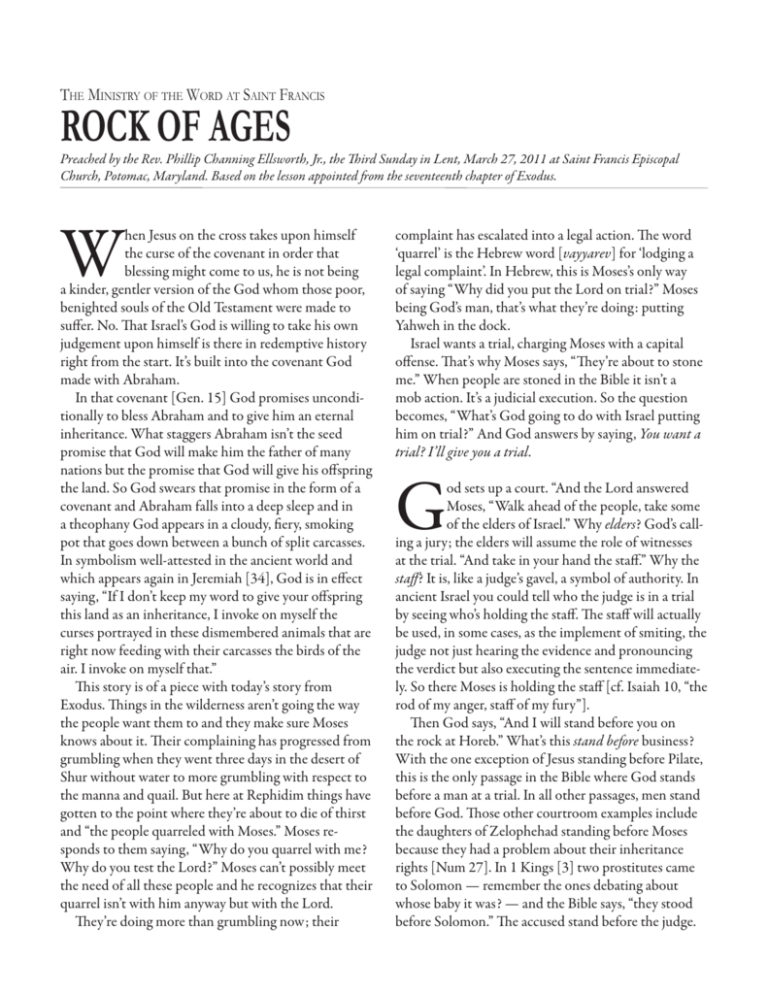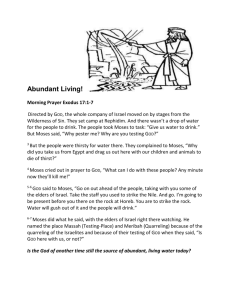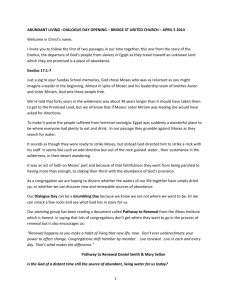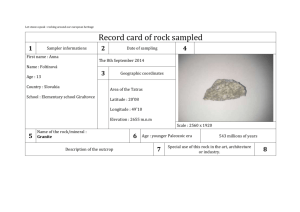ROCK OF AGES - St. Francis - The Episcopal Church in Potomac
advertisement

The Ministry of the Word at Saint Francis Rock of ages Preached by the Rev. Phillip Channing Ellsworth, Jr., the Third Sunday in Lent, March 27, 2011 at Saint Francis Episcopal Church, Potomac, Maryland. Based on the lesson appointed from the seventeenth chapter of Exodus. W hen Jesus on the cross takes upon himself the curse of the covenant in order that blessing might come to us, he is not being a kinder, gentler version of the God whom those poor, benighted souls of the Old Testament were made to suffer. No. That Israel’s God is willing to take his own judgement upon himself is there in redemptive history right from the start. It’s built into the covenant God made with Abraham. In that covenant [Gen. 15] God promises unconditionally to bless Abraham and to give him an eternal inheritance. What staggers Abraham isn’t the seed promise that God will make him the father of many nations but the promise that God will give his offspring the land. So God swears that promise in the form of a covenant and Abraham falls into a deep sleep and in a theophany God appears in a cloudy, fiery, smoking pot that goes down between a bunch of split carcasses. In symbolism well-attested in the ancient world and which appears again in Jeremiah [34], God is in effect saying, “If I don’t keep my word to give your offspring this land as an inheritance, I invoke on myself the curses portrayed in these dismembered animals that are right now feeding with their carcasses the birds of the air. I invoke on myself that.” This story is of a piece with today’s story from Exodus. Things in the wilderness aren’t going the way the people want them to and they make sure Moses knows about it. Their complaining has progressed from grumbling when they went three days in the desert of Shur without water to more grumbling with respect to the manna and quail. But here at Rephidim things have gotten to the point where they’re about to die of thirst and “the people quarreled with Moses.” Moses responds to them saying, “Why do you quarrel with me? Why do you test the Lord?” Moses can’t possibly meet the need of all these people and he recognizes that their quarrel isn’t with him anyway but with the Lord. They’re doing more than grumbling now; their complaint has escalated into a legal action. The word ‘quarrel’ is the Hebrew word [vayyarev] for ‘lodging a legal complaint’. In Hebrew, this is Moses’s only way of saying “Why did you put the Lord on trial?” Moses being God’s man, that’s what they’re doing: putting Yahweh in the dock. Israel wants a trial, charging Moses with a capital offense. That’s why Moses says, “They’re about to stone me.” When people are stoned in the Bible it isn’t a mob action. It’s a judicial execution. So the question becomes, “What’s God going to do with Israel putting him on trial?” And God answers by saying, You want a trial? I’ll give you a trial. G od sets up a court. “And the Lord answered Moses, “Walk ahead of the people, take some of the elders of Israel.” Why elders? God’s calling a jury; the elders will assume the role of witnesses at the trial. “And take in your hand the staff.” Why the staff? It is, like a judge’s gavel, a symbol of authority. In ancient Israel you could tell who the judge is in a trial by seeing who’s holding the staff. The staff will actually be used, in some cases, as the implement of smiting, the judge not just hearing the evidence and pronouncing the verdict but also executing the sentence immediately. So there Moses is holding the staff [cf. Isaiah 10, “the rod of my anger, staff of my fury”]. Then God says, “And I will stand before you on the rock at Horeb.” What’s this stand before business? With the one exception of Jesus standing before Pilate, this is the only passage in the Bible where God stands before a man at a trial. In all other passages, men stand before God. Those other courtroom examples include the daughters of Zelophehad standing before Moses because they had a problem about their inheritance rights [Num 27]. In 1 Kings [3] two prostitutes came to Solomon — remember the ones debating about whose baby it was? — and the Bible says, “they stood before Solomon.” The accused stand before the judge. In the New Testament, John the evangelist [8] writes, “The teachers of the law and the Pharisees brought a woman caught in adultery and they made her stand before the group.” Standing is the posture of the person who’s in the dock. S o who is in the dock at Rephidim? Who is put on trial at Mt. Sinai? God. Who’s acting out the part of judge? Moses. Now let’s say you and I are in that company of elders. What would we expect? What would I expect? Here is God in a theophany possessing the rock, the rock symbolizing God. ‘Rock’ is one of Moses’ favorite names for God. We shouldn’t be thinking in terms of a little stone. The word ‘rock’ is a word used to refer to all of Mount Sinai. So here’s the rock, a physical expression of God who in the glory cloud localizes himself on the rock. There’s Moses with the staff, the rod of judgement. Israel, represented by her elders, witnesses the case. As elders, what are we to expect will happen now that we, brazen, have put God in the dock? I'll tell you what. We expect that God will say to Moses, “You see that staff by which you smote the Nile and caused it to divide, the instrument by which you brought plagues against Egypt?” We expect God to say to his man, “Lift the staff and point it at the elders, and let them have the justice they deserve.” That’s what we would expect, but that’s not what happens. Instead God confides in Moses saying, “Lift the staff. I’ll stand before you on the rock at Horeb. Strike the rock . . . and water will come out of it so that the people can drink.” It’s nearly impossible to imagine. Here’s God’s awesome pillar of glory cloud resting there on the rock. Moses lifts the rod. If we have any wits about us, if we remember what that rod has wrought, we know that when God’s man strikes the glory cloud, everybody save Moses will be blown to smithereens. That is what ought to happen; but it’s not what happens. Instead, when God’s glory cloud and the rock which bears his presence are struck, God takes the blow, and water flows out of the rock. God receives the judgement that the people might receive the blessing. God the Rock takes upon himself the judgement that Israel deserved. And she gets to have a drink on the house. How can Yahweh be the object of judicial execution? How can God receive the judgement that we might receive the blessing? These are the kinds of questions we bring with us to this altar. This is why we sing “Rock of ages, cleft for me.” J esus identified that Rock with himself. In the gospel according to John, when Israel was celebrating the Feast of Tabernacles whereby she remembered these events, in the rites of Jesus’s day, in that eight-day celebration of the Feast of Tabernacles, they would take water, and the priest would pour out water on the ground, and everyone imagined that somehow it would run out of the Temple and go all the way down to the Jordan and ultimately into the Dead Sea, figuratively giving life or blessing to it and causing it to sweeten. They had this rite that they would perform whereby God’s people would remember, O yes, this is our way of remembering how God took care of our thirst in the wilderness. They would do that for seven days. But on the eighth day, the priest wouldn’t do that. John the evangelist tells us that Jesus on the eighth day, on the last day of the Feast of Tabernacles, stood up in the midst of everybody and identified himself as that Rock. “Jesus stood up and said in a loud voice, ‘If anyone is thirsty, let him come to me, and let him drink who comes to me. Whoever believes in me as the scripture has said, streams of living water will flow from within’” [ John 7:37]. Jesus lays claim to that old miracle, causing Israel to kind of transpose it to a higher key and recognize that the literal water represented spiritual water, everything that we would ever need to satisfy our deepest longings. For that reason the apostle Paul in 1 Corinthians 10 said that “Israel drank the same spiritual drink, for they drank from the spiritual rock that accompanied them, and that rock was Christ.” As John tells the story, “everyone who heard Jesus on that day said, ‘No one ever spoke the way this man does.’” Amen.







